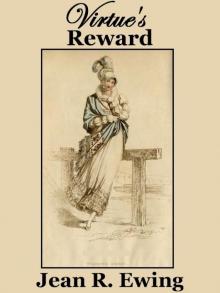- Home
- Jean R. Ewing
Folly's Reward Page 3
Folly's Reward Read online
Page 3
The harebell eyes glanced up. He looked very different now that he was bathed and dry. In spite of his simple clothes, he seemed every inch a gentleman and extremely self-possessed.
“Why, Miss Drake! Breakfast sounds like an excellent idea. But what celestial fare do angels eat? Shall we dine on ambrosia and honeydew?”
Bobby ran up to her to fling his arms around her skirt.
“I want eggs,” he said.
Prudence hugged him, then watched the child run across the yard back to the house. She glanced down at the man, now resting comfortably on the floor with his back against the wall. He grinned up at her with a bravado that dared her to object.
“Whoever you are, please don’t do this,” she said. “It’s not fair to Bobby.”
“What isn’t fair?”
“That you should try to charm him. What if he begins to care about you? He lost his mother when he was too little to remember her, and his father has been dead only a few months. Why should Bobby matter to you? How long do you plan to stay here? A few days? A week?”
His dark lashes dropped over his blue eyes for a moment. “I shall not do Bobby any harm. I only offer him a little friendship.”
“A friendship? Is that what I saw happening here? He is besotted with you. Good heavens, sir! You are only a passing encounter in this child’s life. It’s unconscionable that you should encourage him to care about you, then leave him bereft once again.”
The warm glow of light from the stove flickered lovingly over the bones of his face.
“Then you don’t think strangers should offer love to each other, even briefly? What a cold-hearted world you would like to inhabit, angel!”
“Love? That’s an emotion that grows out of knowing a person well. By definition strangers can’t love each other.”
He lifted his lashes and gazed straight at her with a treasury of lightly felt mockery.
“Not even in Christian charity?”
It only made Prudence angry.
“We’re not talking about Christian charity,” she snapped. “We are talking about wantonly engaging deep, personal feelings that can’t be returned. That you have no intention of returning.”
“How can you know what my intentions are?” The laughter disappeared from his face. “As it happens, I don’t agree with you at all. I think the world is a lonely enough place, so lonely that the people in it should love each other whenever they can, even if for only one day, or for only one night, as long as they’re honest with each other.”
“What has honesty to say to the matter?”
“It says that caring and sympathy are feelings that should never be withheld. Why the devil shouldn’t Bobby find a little temporary comfort in me, if he wants to? And if the child gives me his trust, I promise you I shan’t betray it.”
Prudence was truly angry now. “This is arrant nonsense, sir, and you know it. Out of vanity, you’re letting him form an attachment, which you will break as carelessly as a crust of bread, leaving him completely abandoned. I would be very grateful, therefore, if you would keep your distance.”
“Sorry, angel. I don’t agree and I won’t do it.”
“Sir, Bobby is in my charge. I think I know what’s best for him.”
In a remarkably smooth movement, he stood and walked boldly up to her. His voice had become tight, as if he also bit back anger.
“No, you don’t, Miss Drake. You don’t even know what’s best for yourself. Why the devil do you pull your hair back so severely? It makes you look like a nun. Is that the idea?”
Prudence felt hot color burn up her neck. “We’re not talking about me, sir. We’re discussing the child.”
“You may be talking about the child, sweet creature of heaven. I am talking about you. Are you honest? I don’t know who I am and I freely admit it. Do you know who you are?”
“I am Prudence Drake,” she said, and hated to hear the frantic, unsure tones in her own voice.
“And who is that? A governess, very prim, very proper. Have you ever let your hair down?”
“What do you mean? Of course.”
“No, I don’t mean when you comb it out at night and instantly trap it back into a severe plait again. Have you ever let down your hair and run along a beach in your shift? Or pulled out your pins because a warm breeze is blowing from the summer sky and you want to feel the long tendrils caress your bare arms? Have you ever let down your hair in front of a man?”
The flood of uncomfortable heat coursed through her body. “Oh, good gracious! This is absurd and outrageous, sir.”
He grinned and the odd mood was broken.
“Yes, it is, isn’t it? Yet I would still like to know, though I have no idea why. Forgive me, Miss Drake. I am just a scoundrel from the sea. But when you suggest that I might do some harm to the child, it makes me forget my better manners. I beg you will accept my most humble apology, if my talk runs wilder than my more honorable intentions.”
He gave her a glance so full of contrition that Prudence felt her indignation die away, although her uncertainty and the flush in her blood remained. Truly, how could this man do Bobby any damage? Was she—ignobly—jealous, that he had so very simply and quickly earned the child’s confidence?
“Very well,” she said. “I realize that all this must be very hard for you, too. Not knowing who you are or whence you came. How do you suppose you acquired your ease with children? Do you think you have a little boy of your own?”
“Good God! No! At least, I don’t believe that I do.”
He looked down at his hands and spread the fingers, long, slim, square-ended. Naturally elegant hands, undamaged but for some scrapes and blisters of recent origin. Hardly the hands of a sailor!
“I’m not wearing a wedding ring,” he said.
“Not is there the trace of one, sir, so I do not think you are married.”
He glanced back at her, and she knew that even if he had asked for forgiveness, she was not entirely forgiven.
“Not that the lack of a wedding precludes bastards, of course.”
Prudence flushed scarlet with chagrin. He was baiting her deliberately. She refused to rise to it.
“Perhaps you have brothers and sisters, then.”
“John,” he said suddenly. His expression opened, as if touched with genuine revelation. “I have a little brother, John. And sisters.”
“What are their names?”
“Matty, and—” He stopped and looked blankly at her. “I’m not sure if that’s right.”
“Matty who? John who?”
“I don’t know.”
“What other names come to mind, sir?”
He stepped up to the stove and opened it. The glare cast red light over his high cheekbones and touched sparks of fire in his hair. He loaded more fuel.
“Helena.” The word escaped with his breath, soft as a caress.
“Who’s Helena? A little sister?”
“I don’t think so.” He ran one hand over his head. “Dear God, how absurd this makes me!”
Prudence felt a surprising rush of compassion. Dear Lord, whatever he was, what a frightful predicament this must be for him!
“You must choose a name for yourself. We can’t go on referring to you as the drowned gentleman, can we?”
“Very well, what do you suggest?”
“You said your name began with ‘P’, or maybe ‘H’. Peter, Paul?”
He grinned at her. “Percival, Philoctetes? Hector, Hyperion, Hercules? Polycrates, Plutarch? Ah, Miss Drake, how nice to see you smile again. Hannibal?”
Prudence forced her brows together in a frown. “Percy, Philip, Patrick? Hugh, Henry, Harold? Does nothing ring a bell?”
“Henry, Harold—the bell begins to tinkle somehow. Oh, dear God, of course! ‘Harry the fifth’s the man, I speak the truth.’ I believe I am named after Prince Hal, angel. ‘Hal’ rings a distinct bell. In fact I believe it rings a carillon, enough to shake the bell tower and deafen the campanologist. You may cal
l me Hal, Miss Drake, if you please.”
“Hal who?”
His expression closed, whether from desperation, frustration, or deliberate concealment, Prudence couldn’t say.
“Now that’s another question for another time, don’t you think? Like Tantalus, I’m starving, Miss Drake. Allow me to escort you to breakfast.”
* * *
The mist did not entirely burn off until the next week, when bright sunshine at last streamed unhindered into the courtyard. Prudence sat by the nursery fire mending clothes as Bobby played with a pile of blocks. She couldn’t stop thinking about Hal. There seemed to be nothing she could do about Bobby’s affection for the man. And her hostility to this disturbingly handsome stranger only resulted in Hal’s teasing her even more unmercifully.
So she had avoided him, and done her best to keep Bobby out of his way.
For an entire week.
Yet for an entire week, she had not been able to stop thinking about him. Every day she would hear his laughter and the ring of his boots. His eyes watched her at every mealtime, even though she kept her gaze firmly on her plate. And she had dreamed about him again—every night for a week.
It seemed like an unpardonable treachery to herself, and filled her with fury.
When she stepped out into the yard first thing the next morning, she found him sitting on the mounting block, the sun sparkling on his dark hair. Very much at ease, his long legs stretched before him, Hal wore one of Mr. MacEwen’s old coats. He was vigorously polishing his boots.
Prudence tried to ignore him, but as she walked past he looked up and laughed.
“‘And is not my hostess of the tavern a most sweet wench?’ / ‘As the honey of Hybla, my old lad of the castle—?’”
Which was Prince Hal and Falstaff, wasn’t it? All those evenings spent reading aloud with her father and the other children around the fire came flooding back. She stopped and turned to face him.
“I do not mean to be inhospitable—”
“It doesn’t matter,” he said, rubbing hard at the salt stains. “I don’t blame you. I asked for honest emotions, so I can hardly complain if that’s what I’m getting. Yet Drake isn’t generally a Scottish surname. Are you, too, hiding behind a name that may not be your own?”
“My father came from Devon to study medicine in Edinburgh. He met my mother there, married her, and stayed in Scotland. There’s no mystery about it.”
“Which says nothing as to why you’re so afraid.”
The cold breeze chilled her face. “I’m not—”
“Yes, you are. I know fear when I see it. You’re afraid for Bobby, and not just because he’s so recently orphaned. But if you are indeed hiding here, you’re being very foolish, angel.”
Panic beat beneath her bodice. “What has Bobby told you?”
“Nothing to concern you, not even who he really is, for I haven’t asked.” His blue gaze seemed sincere, even indignant. “I would not steal secrets from a child.”
“We’re here for a little holiday, that’s all.” She hated to lie to him, but how could she risk the truth? “We’re not hiding, though I think perhaps you are. Have you recalled anything more about yourself?”
Hal closed his eyes for a moment. “Shadows,” he said. “Dreams. Little that makes sense. Your name is English, but you have lived your life in Scotland. I have no name, but—”
“But what?” she asked.
He thrust on his boots and leapt lightly to his feet. “But I know this: I’m not used to cleaning my own footwear. And I’m certain that I’ve never been this far north in my life.”
“How can you be sure?”
“Who could forget this place?” He glanced away at the peaks rising behind the Manse. “A landscape that sinks so deeply into the soul? There’s nothing tame here, nothing easy, nothing familiar. I am more swallowed up by these mountains than any seal swimming the far ocean.”
“You must have been going somewhere in Scotland,” Prudence said desperately. “Surely it was only chance that brought you here?”
“Maybe, maybe not.” His blue gaze seemed seductively open, even vulnerable, but then he laughed and bowed. “Perhaps I came here to find you.”
Which caused Prudence to flush unhappily with color and flee back inside.
Yet Hal had so easily insinuated himself into the household. He seemed to have a natural gift with children. In spite of her attempt to warn him off, every day he had offered a feast of games and stories that enchanted Bobby.
Mr. MacEwen happily announced that he had found a willing hand to help him with his work. Mrs. MacEwen had been thoroughly charmed out of all of her dire suspicions.
So by the time the sun returned to Argyle, Hal had taken over the room in the stable as if he owned it, and had the run of the Manse as if he were an honored and trusted guest.
Prudence sat with Bobby for a while as the child built a tower with his blocks, then she walked restlessly to the window. Dear God, Hal could be anyone!
But it was becoming clear what he was not. He was not an ordinary, comfortable person. He wasn’t safe, or reassuring, or easy to understand. Hal was not like the boys or young men she had known while she was growing up, the respectable daughter of a country doctor. And he was nothing like her brothers.
As she stood staring blindly out at the sleeping mountains of Lorne, gunfire shattered the silence—two shots in quick succession, followed by the unmistakable thud of lead balls hitting a soft target. Prudence whirled around.
Faster than she could react, Bobby jumped up, the blocks tumbling unheeded behind him, and ran from the room.
Chapter 3
Prudence found Bobby hanging onto the five-barred gate that led from the courtyard into the sheep runs behind the workshop.
“Look, Miss Drake!” Bobby called. “Mr. MacEwen has made a new pistol, and Hal is trying it out.”
Prudence watched as Hal primed and reloaded a pair of dueling pistols that Mr. MacEwen had finished making earlier that week. Hal was in his shirtsleeves, with the cuffs rolled back to show his strong, lean forearms and clean-boned wrists. He wore no cravat. Instead, his rough work shirt lay open at the neck, the collar twisted carelessly. His hair was a little long. It overhung the high collar by several inches at the back.
“They’re a little short in the barrel for my taste,” he said to the older man. “But they don’t lack for accuracy, and the trigger approaches the dishonorable in sensitivity. A deuced fine piece of work, sir.”
With a pistol in each hand, Hal spun toward a paper target, which Mr. MacEwen had fixed to the side of his haystack. Almost casually Hal lifted each arm in turn, and fired.
“Another two bull’s-eyes!” Bobby squealed.
Prudence knew very little of firearms, even though gunsmiths kept workshops at Dunraven. But she could recognize expertise when she saw it. A stunning proficiency lay in every line of Hal’s figure—in the careless, masculine stance, the perfect line from shoulder to hand and along the barrel, the passion that concentrated his expression. The target had been neatly punctured four times in the exact center. Hal was a dead shot—and with either hand, for heaven’s sake!
She bent and caught Bobby around the shoulders. This could ruinously increase his hero-worship for the stranger. Only the promise of warm scones in the kitchen was enough to make the child jump from the gate and run inside, out of harm’s way. She watched him go with unrepentant relief.
“An awkward skill, don’t you think, angel?” Hal asked.
Prudence turned and looked up at him. He had left Mr. MacEwen examining the pistols, and walked over to her. Sunlight glanced off the ruffled hair over his forehead, casting shadows onto the clean bones of his face.
“What do you mean?”
“That I should show such a nasty and thorough proficiency with firearms.” Hal looked thoughtfully at the target. “What do you think that reveals about me?”
“I don’t know,” Prudence said. “Most gentlemen shoot, don’t they?�
�
She felt foolish and inadequate in the face of his easy confidence.
He grinned. “Well, thank goodness for that! But the real question is: What kind of gentlemen?”
“What do you mean?”
“A gentleman may enjoy shooting at his pheasant, or even possibly at his neighbor if they should quarrel, but he’s not generally going to devote himself so exclusively to mayhem with a pistol that he would bother to devote unending hours of practice to it. And that”—he nodded at the target—“speaks to an unhealthy amount of time in a shooting range.” He laughed suddenly. “Perhaps I am a gentleman of the road?”
Prudence sensed danger as clearly as if he pointed a pistol at her heart.
“Oh, goodness! You think you are a highwayman?”
“We can’t be sure, can we? Do you think I am dedicated to a life of crime, angel?”
“Please, don’t,” Prudence said.
He looked down at her. “Don’t what?”
“Don’t call me angel! It’s silly and inappropriate.”
He touched her hair lightly where it swept over her ear into her severe bun. It was the briefest, most impersonal of caresses and his hand dropped immediately, but she felt the effect of it shake her to the knees.
“No, it’s not,” he said gently.
Prudence colored. “And improper and overly familiar.”
“Is it? I wouldn’t wish to truly distress you, but a highwayman is used to treating ladies with cavalier gallantry, isn’t he? Didn’t the infamous Claude Du Vall dance a coranto with a lady victim on Hounslow Heath? To the music of her own flageolet, no less.”
“How could she play if she was dancing?” Prudence asked.
The blue eyes surveyed her gravely. Yet beneath the seriousness of his expression, laughter bubbled like water boiling below a pan lid.
“The tale doesn’t say. Perhaps her maid was also proficient at the flute. And then he took her jewels, her husband’s money, and her heart, of course. ‘Du Vall, the ladies’ joy; Du Vall the ladies’ grief’—he ended up in Newgate.”
Prudence ran one hand firmly over her hair as if to brush away the lingering trace of his hand.

 Rogue's Reward
Rogue's Reward Scandal's Reward
Scandal's Reward Valor's Reward
Valor's Reward Folly's Reward
Folly's Reward Virtue's Reward
Virtue's Reward Love's Reward
Love's Reward